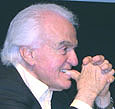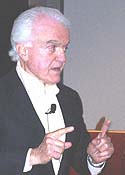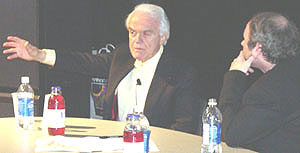| Movies in the Digital Age | ||||
|
Jack Valenti, president of the Motion Picture Association of America (MPAA), will discuss the impact of digital technology on the entertainment industry. Drawing on his experience as an advocate for major producers and distributors of entertainment programming for television, cable, home video, he will discuss the promise and the dangers of emerging technologies for the production and distribution of films and TV shows. Speaker Moderator: Thomas Doherty is associate professor of American Studies and chair of the Film Studies Program at Brandeis University. His books include Pre-Code Hollywood: Sex, Immorality, and Insurrection in American Cinema, 1930-1934 and Cold War, Cool Medium: Television, McCarthyism, and American Culture. He also serves on the editorial boards of Cinema Journal and Cineaste. [This is an edited summary, not a verbatim transcript.] THOMAS
DOHERTY introduced Jack Valenti by offering a brief account
of his career in advertising, national politics and president
for 38 years of the Motion Picture Association of America. Recalling
Valenti's service as a special advisor to President Lyndon B.
Johnson, Doherty described him as "an eyewitness to, and
participant in, more than his share of history." The organization
that became the MPAA was established in 1922, Doherty said.
Since then "there have been seven popes, 15 U.S. presidents,
and 33 managers of the Boston Red Sox, but only three presidents
of the MPAA."
JACK VALENTI spoke of his service under Lyndon B. Johnson, and his early days as MPAA president, but focused on the current issues of piracy and the need for new distribution models for movies. But first, he acknowledged a band of students who were dressed as pirates in the audience. He jokingly welcomed these "friends of Johnny Depp, the Pirates of the Caribbean." When Valenti took the reigns as MPAA president in 1966, his first major initiative was to remove the last vestiges of Hays Office censorship. In 1968 he abolished the Production Code, the industry-imposed set of guidelines that spelled out what was not considered morally acceptable in the production of movies. As an alternative, he introduced the movie ratings system. When he
instituted the film rating system, he had two objectives in
mind: first to protect children and provide a warning system
for parents, but more importantly to "free the screen."
As a defender and advocate of the First Amendment, Valenti despises
the censorship of the Production Code, which limited the kind
of stories directors could tell. However, with the directors'
right to tell stories is the concomitant right of the audience
not to watch them. Despite criticism that the system is too
subjective, Valenti defends it as necessary for parents to be
able to make decisions about their children.
Valenti
recognizes the Internet as the greatest distribution channel
that ever existed. The movie industry is willing to embrace
the web as an efficient distribution system, to make movies
available on demand for a price that is fair to the consumer
and delivered in a safe fashion. This will give people more
choices than they ever had in terms of movie titles and ways
of viewing. This is why Valenti and other members of the industry
are aggressively meeting with IT people for help with developing
the technology for protection.
VALENTI:
When I invented the movie ratings system, I consulted with many
social scientists and psychologists about what could be considered
excessive violence, or what constituted adult content. Their
ideas were vapory. To this day, even the Supreme Court is unable
to define obscenity. It is a very subjective process. VALENTI: It is very hard for the MPAA to set guidelines for each individual owner of a movie and say what they can or cannot charge, because of anti-trust laws. The MPAA is not allowed to set a business model for every owner. QUESTION: You have spoken before against VHS, that if people could record programs with their VCRs, it would be the death of the movie industry. But now VHS and DVD sales make up over half the industry's profits. VALENTI: No one remembers the context in which I said that. Instead of abolishing VHS, I believed there should be a copyright royalty fee on blank cassettes, which is what they do in Europe now, and the money goes back to the owners of the copyright. The Supreme Court did not rule that VHS infringed upon copyrights, so there was no royalty fee. QUESTION: The record industry blames piracy for the decline in music sales, but there are other factors such as the lagging economy, or the rise in spending on video games and other forms of entertainment. My personal experience was that downloading got me more interested in music, and I have actually spent more money on CDs. How do they make the correlation that the increase in downloading leads to decrease in sales? Do you expect the same correlation for movies? VALENTI:
I cannot speak for the music industry, and I don't make the
same correlation for movies today. Rather, my emphasis is on
looking towards the future of movies. Right now, it takes a
while to download movies even with a broadband connection. Next
year, it could take 5 seconds if systems like FAST are launched.
If that happens, the fate of the movie industry will be bleak.
IAN CONDRY, MIT Foreign Languages and Literature: Isn't it misleading to say that creative property is the same as a table? File sharing takes place in a kind of ethical setting, where you are often sharing with friends and there is a social aspect. Can non-commercial use such as sampling or building interest for a piece of work be acceptable? I also believe that people will always pay for quality. Why not build that side of the equation instead? As Asia and other parts of the world are building different ideas of intellectual property, are you putting the American industry at risk by protecting revenues rather than generating enthusiasm for new media? VALENTI: I don't agree that a space like Kazaa is ethical. If one copy of a movie is available online for the whole world to see at home, then no one will buy it. Only about 1.5 out of 10 movies make their money back from theatrical exhibition. Movies need other venues such as cable and home video to survive. If you shrink the profits from those venues, you shrink the reinvestment in movies. Non-commercial use will destroy the business, which is very fragile. ANDREW BROOKS, MIT Media Lab: What about the rights of consumers who buy DVDs legitimately, but suffer from problems with regional codes? I purchase a DVD in Australia and can't see it in the United States, which makes me want to download movies. VALENTI: Regional codes were the result of parallel imports. Smugglers from Asia ship bootleg material to the U.S., and regional codes ensure that such discs cannot be played. I understand why they came into being, but there are machines now that can play all codes. QUESTION: Since the South Korean film industry has become more vibrant, it is trying to defend the quota system that requires movie theaters to show homegrown movies on at least 40% of their screens. Can you comment on that situation? VALENTI: The quota demands South Korean cinemas show local films at least 146 days a year. I am fighting that quota because I am an advocate of competition. We have the right to enter their market as much as they can enter the U.S market. They just need to find a theater and distributor for it here. If a theater in Korea wants to show an American film, it should have the right to. Some theaters have to close because there are not enough Korean movies to keep them alive.
QUESTION: The music industry is trying a different business model with websites like Apple's iTunes that charges $0.99 per download. Are there any new business models for selling movies? VALENTI: There are websites like Movielink and Cinema Now that have Internet rentals for low prices. New channels for movies are still being tested and improved. CLARA FERNANDEZ, CMS graduate student: A large amount of money is spent on publicity for a movie. Why can't the industry focus on the quality of the movie, and rely more on word of mouth? VALENTI: Marketing is important because it gets the public in an excited, movie-going mood. It only helps a movie on the first weekend. After that, word of mouth does take over. Marketing adds to the social experience of a movie that is not easily duplicated . ANDREA
McCARTY, CMS graduate student: Projection in theaters is
being converted to digital — is this helping the industry
by saving costs in distribution? MATTHEW WEISE, CMS graduate student: Can you elaborate on what a bleak future for the movie industry might actually look like? VALENTI: It won't be the end of Hollywood, but it will be very different. There will be more pilfering of movies, because it is so easy. There will be less investment in films, fewer films made, and jobs will be lost. There is already much unrest over movie productions moving to Canada, so imagine if there are fewer productions. Valenti
also spoke of his career before the MPAA, in particular his
relationship with Lyndon B. Johnson. In 1952, he co-founded
the advertising and political consulting agency of Weekley &
Valenti. In 1955 he met then Senate Majority Leader Johnson.
Valenti's agency was in charge of the press during the visit
of President John F. Kennedy to Texas. Valenti was in the motorcade,
six cars back of the president, when he was assassinated in
Dallas on November 22, 1963. Within an hour of Kennedy's assassination,
Valenti was hired as Special Assistant to President Johnson. DOHERTY: Can you share your account of what happened on November 22, 1963, when John F. Kennedy was assassinated? VALENTI: I have a searing memory of the events that I pray this country will never go through again. I was in the motorcade, six cars behind Kennedy. When the cars ahead of us suddenly went from eight to eighty miles per hour, it never crossed my mind that such a brutal act had occurred. I thought the president was late for his speech at the Dallas Trade Mart, and I ordered our driver to take us there. That is where I found out that the president and governor had been shot. A deputy's car took me to Parkland Hospital. When one of Johnson's aides told me the president was dead, I became unhinged. But I had to compose myself, because he told me I was to go aboard Air Force One, and I had no idea why. A police car took me to Love Field where I boarded Air Force One. There, Johnson asked me to fly back to Washington with him and be on his staff. I had never even been to the White House, and didn't know what it meant to be on the president's staff. I didn't have a place to live in Washington, so Johnson said I could stay with him for the time being. So I lived on the third floor of the White House for a month and a half. I was one of two special assistants to ever live there; the other was Harry Hopkins under Franklin D. Roosevelt. Johnson
made a crucial decision on the airplane that I marvel at: he
wanted to be sworn in with a proper ceremony. He wanted a picture
of it to be flashed around the world, so that amid the anxiety
and desperation, he could show that the Constitution worked
- that the nation goes on, and the president lives. Johnson
asked Mrs. Kennedy to stand beside him to show that Kennedy's
legacy would be carried on. Mrs. Kennedy was in a catatonic
trance; her pink blouse was still stained with blood, and she
wouldn't change it. I am in that picture watching the two of
them, stunned at the enormity of the situation. --summary
by Lilly Kam
|
||||




